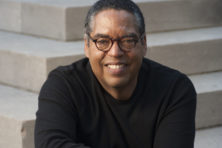Prose Judge: David McGlynn
- Share
- Tweet
- Pin
- Share

This year’s prose contest was judged by David McGlynn, a professor of English at Lawrence University in Appleton. Graduating with a B.A. in English and Philosophy from the University of California, Irvine in 1998, McGlynn went on to receive his M.F.A. (2001) and Ph.D. (2006) from the University of Utah, where he also served as the Managing Editor of Western Humanities Review.
A writer of both fiction and non-fiction, his work has appeared in a number of literary journals and publications, including Alaska Quarterly Review, Image, Mid-American Review, and Shenandoah. McGlynn’s essay, “Rough Water,” about his lifelong love affair with swimming, was selected for inclusion in Best American Sports Writing, slated to appear in October 2009.
McGlynn’s collection of short stories, The End of the Straight and Narrow, which was released in October 2008, has garnered him much acclaim. The book is a finalist for the 2009 Steven Turner Award for Best Work of First Fiction from the Texas Institute of Letters and a finalist for the 2009 ForeWord Magazine Book of the Year Award.
David McGlynn: About Winning…and Not Winning
Literary contests are a little like winning the lottery: in most cases, the prizes are small and the victory meaningful primarily to the winner and those closest to her. In very rare cases, they change lives, launch careers, move the obscure writer out from the shadows and into the bright lights of the world’s wonder and attention. When playing the lottery, you know when your number might “hit”; literary contests, too, are highly subjective. Different judges look for different things in a story (or essay or poem) and therefore favor different aspects of a work. I personally look for a story to involve me in its world, to use scene and action and dialogue to create an entire imaginative environment for me to envision. The more I’m involved in a story, the more I disappear into it, the more I enjoy it. A different judge would certainly say she seeks other things. As a judge, I’m of course aware of this subjectivity and try to work around it as best I can. But I can’t get completely around it. The hardest thing about judging a work is that, in the end, I have to declare one a “winner,” which seems to imply that it’s a story more worth hearing – that the plot is stronger. Often that’s not the case. Often the winner is simply the one that stuck with me the longest, and often for mysterious reasons.
Thus, I like to tell new writers to pursue contests, but to do so with a sense of perspective. Winning contests helps us, as writers, to keep going, to feel confident that our work is worth pursuing. But not winning a contest doesn’t mean that the work isn’t worth pursuing. Not winning might mean that we have more to learn, or it might mean that the judge of our contest had her eye cast on different things. In the end, it’s most important to keep writing, to have faith in the work and to do everything you can to see it through. Don’t be afraid to make mistakes, for mistakes teach us far more than our successes.


